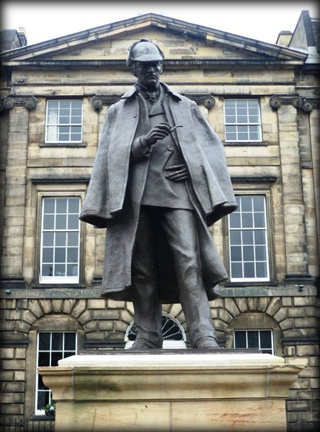Aspects of a fictional detective's character
By Amal Hewavissenti
Sherlock Holmes, a fictional detective immortalised by Sir Arthur
Conan Doyle became immensely popular since he first appeared in the
Strand published in 1891. He is still popular all the world over.
|

Sherlock Holmes statue in Edinburgh, erected opposite the
birthplace of Doyle which was demolished c.1970 |
The detective Sherlock Holmes emerged in an era which was about to
witness the great discoveries and advanced technology in science and
arts. Though a detective should equip himself with advanced scientific
technology and methodology, Holmes had to employ surprisingly simple
methods and equipment for a successfully crime detection.
Holmes had to make do with gas lamp instead of an electric bulb, a
small lantern instead of an electric torch. He had to be satisfied with
a telegraph machine and a telephone with the most primary condition in
place of improved equipment for communication.
He travelled in horse carriages and steam trains. Yet, this Bohemian
detective with great intellectual prowess used a 'simple' hand lens to
solve the most baffling mysteries. Because of his ability to solve
crimes with deductive reasoning and astute observation, Sherlock Holmes
remains in heightened popularity and game for about a century.
Our attempt however is not to discuss the mysteries and crimes he
solved or interesting events related to his detective life but to have a
look at the varied aspects of his complex personality as a detective.
Holmes is indeed a strange character in fiction.
Criminals
Sherlock Holmes is a silent actor and has the capacity to track down
criminals by means of traps and strategies set dramatically. In certain
scenes, Holmes rationally presents clues and his own discoveries which
totally astonish even those associated with the particular case.
He reveals the exciting truth of the crime on the final stage in
partnership with Watson. He vividly describes his own procedure of
detecting a crime with ample illustrations and calculates when and how a
particular death has occurred. On successful resolutions of crime, he
habitually avoids commenting on the level of his success. He
communicates more with Watson than with Police but assumes authority
over police officers. As Watson describes, he was an occasional user of
morphine and cocaine which was his "only vice".
Sherlock Holmes by nature was disorganised in his personal life. As
Watson says, Holmes is totally oblivious to the confused nature of his
room with remains of chemical experiments and note books and records
lying scattered in it. This he states in The Adventure of the Musgrave
Ritual. He is generally late to rise and the one who enters his room may
be distracted by the smell of tobacco.
Most often, Sherlock Holmes smokes his pipe heavily, bends the truth,
conceals evidence, misguides the police and burgles houses to make
things better for his criminal investigation. In Victorian England, such
actions were justified as long as they were done by a gentleman to
ensure the safety of the society.
He, at the same time, holds back his reasoning without revealing it
or giving only cryptic hints and surprising results until the very end
when he explains all his deductions at once. He is a superb actor. In
several of his adventures he pretends to have been seriously wounded to
give effect to his case or to incriminate those involved. This is much
evident in the story The Adventure of the Dying Detective.
In 2006, Copplester researched about the criminal investigation
methods used by Holmes during the 19th century. Copplester concluded
that Holmes' intellectual level lay on a higher elevation and his
methodology was proved to be far more advanced for the 19th century
Europe.
Arrogance
Holmes has an ego which sometimes borders on arrogance that is often
justifiable. He is quite content to allow the police officers to gain
the credit for his work and success while Watson broadcasts his own role
in the particular case.
He dispassionately surveys brutal crime scenes and does not endorse
superstition. He does not allow grotesque situations make him afraid and
intrepidly confronts violent murderers. He had an exceptional capacity
for emotional dealings and friendship. Holmes was sometimes seen to
possess a remarkable ability to soothe and reassure people under high
pressure who were suffering from the strong sense of being unsafe.
Irene Adler was the only lady who succeeded in creating in him an
interest which verged on the romantic. She was always referred to by
Holmes as "The Woman" as Watson says.
In the story The Adventure of Charles Augustus Milverton, Holmes is
engaged to be married but only with the purpose of obtaining data for
his case. Normally he demonstrates certain interest in several ladies -
specially charming female clients in most of his cases.
In any case, Holmes manifests no further interest in the female
client once she ceases to be the centre of the particular problem he is
solving. |

